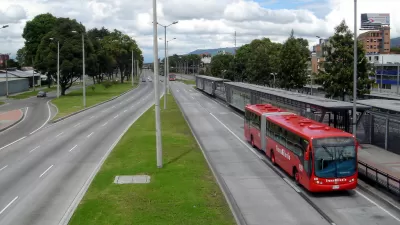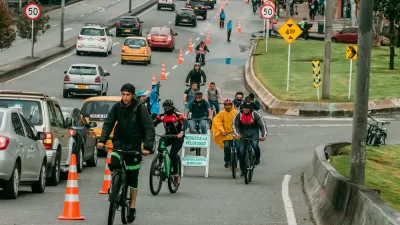The world's most famous, and influential, bus rapid transit system, which served 2.4 million riders a day in Bogotá in the days before the pandemic, offers lessons in transit planning and management as it enters its third decade.

An article by Walter Hook and Annie Weinstock looks back at the first 20 years of operation for the TransMilenio bus rapid transit system in Bogotá, Colombia.
As mentioned in the article, TransMilenio is very much associated with former Mayor Enrique Peñalosa, who launched the system in 2000 and took charge of the system again in a second term that concluded in 2019.
Among Peñalosa’s contributions to the system, the article lists the formalizing of the city's informal public transport industry as a supplemental development initiative. By implementing a competitive bid process for TransMilenio operators, according to the article, working conditions improved for bus operators, bus services began operating on a schedule for the first time, and bus stops became safer for riders.
The article then turns to the work accomplished, as well as mistakes made, during the tenure of former Mayor Samuel Moreno. While bringing more of the informal transport industry under contract, the Moreno made several errors that offer critical transit planning lessons, such as poor integration between bus systems, problems with fare cards, and other problems with transit operators.
According to the article, Peñalosa’s second term expanded and stabilized the sytem. "[D]espite a major downturn in the system’s finances under the subsequent mayors who served between 2008 and 2016, the TM BRT had nearly returned to full cost recovery just before the pandemic, at the end of Peñalosa’s second term."
Still, Peñalosa's second term proved controversial (especially to some outside observers) helping propel Mayor Claudia López to office on a platform that included opposition to expansion plans proposed by Peñalosa. Since taking office, Colombia has been hit especially hard with the economic and public health consequences of COVID-19, and TransMilenio is facing a funding crisis like so many transit systems around the world. "In 2020 TM’s deficit increased by 135% percent compared to 2019, for a total of USD 610 million. Fare revenue dropped by around 50%."
According to the article, the challenges facing TransMilenio have also become intertwined with the national political upheaval in the country, but the opportunity to finally achieve affordable "world class BRT on much-needed trunk corridors integrated with a high-capacity metro through part of the urban core" is possible when the smoke from political violence clears in Colombia.
FULL STORY: TransMilenio 3.0: Integrating Metro and Informal Transit Citywide

Planetizen Federal Action Tracker
A weekly monitor of how Trump’s orders and actions are impacting planners and planning in America.

Maui's Vacation Rental Debate Turns Ugly
Verbal attacks, misinformation campaigns and fistfights plague a high-stakes debate to convert thousands of vacation rentals into long-term housing.

San Francisco Suspends Traffic Calming Amidst Record Deaths
Citing “a challenging fiscal landscape,” the city will cease the program on the heels of 42 traffic deaths, including 24 pedestrians.

Defunct Pittsburgh Power Plant to Become Residential Tower
A decommissioned steam heat plant will be redeveloped into almost 100 affordable housing units.

Trump Prompts Restructuring of Transportation Research Board in “Unprecedented Overreach”
The TRB has eliminated more than half of its committees including those focused on climate, equity, and cities.

Amtrak Rolls Out New Orleans to Alabama “Mardi Gras” Train
The new service will operate morning and evening departures between Mobile and New Orleans.
Urban Design for Planners 1: Software Tools
This six-course series explores essential urban design concepts using open source software and equips planners with the tools they need to participate fully in the urban design process.
Planning for Universal Design
Learn the tools for implementing Universal Design in planning regulations.
Heyer Gruel & Associates PA
JM Goldson LLC
Custer County Colorado
City of Camden Redevelopment Agency
City of Astoria
Transportation Research & Education Center (TREC) at Portland State University
Jefferson Parish Government
Camden Redevelopment Agency
City of Claremont



























